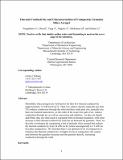Thermal conductivity and characterization of compacted, granular silica aerogel
Author(s)
Neugebauer, Adam Halbert; Chen, Kevin; Tang, Astera S.; Allgeier, A.; Glicksman, Leon R.; Gibson, Lorna J.; ... Show more Show less
DownloadGibson_Thermal and SI.pdf (2.694Mb)
PUBLISHER_CC
Publisher with Creative Commons License
Creative Commons Attribution
Terms of use
Metadata
Show full item recordAbstract
Monolithic silica aerogels are well known for their low thermal conductivity (approximately 15 mW/(m K)) (Aegerter et al. (Eds.), 2011. Aerogels Handbook, first ed., Springer-Verlag New York, LLC, New York, NY). Their low relative density (typically less than 5%) reduces conduction through the solid and their small pore size, typically less than one hundred nanometers, on the order of the mean free path of air, reduces conduction through air, as well as convection and radiation. As they are fragile and brittle, they are often used in a granular form in thermal insulation, with some increase in their thermal conductivity from the air between the granules. Here, we describe a technique for compacting a bed of granular silica aerogel that reduces the thermal conductivity from 24 mW/(m K) (when uncompacted) to 13 mW/(m K) (after compaction). We find that there is an optimum level of compaction to minimize the thermal conductivity: at higher levels of compaction, the contact area between the granules increases and the granules densify, increasing conduction through the solid.
Date issued
2014-04Department
Massachusetts Institute of Technology. Department of Architecture; Massachusetts Institute of Technology. Department of Materials Science and Engineering; Massachusetts Institute of Technology. Department of Mechanical EngineeringJournal
Energy and Buildings
Publisher
Elsevier
Citation
Neugebauera, A., K. Chen, A. Tang, A. Allgeier, L.R. Glicksman, and L.J. Gibson. "Thermal conductivity and characterization of compacted, granular silica aerogel." Energy and Buildings 79 (August 2014), pp. 47-57.
Version: Author's final manuscript
ISSN
03787788